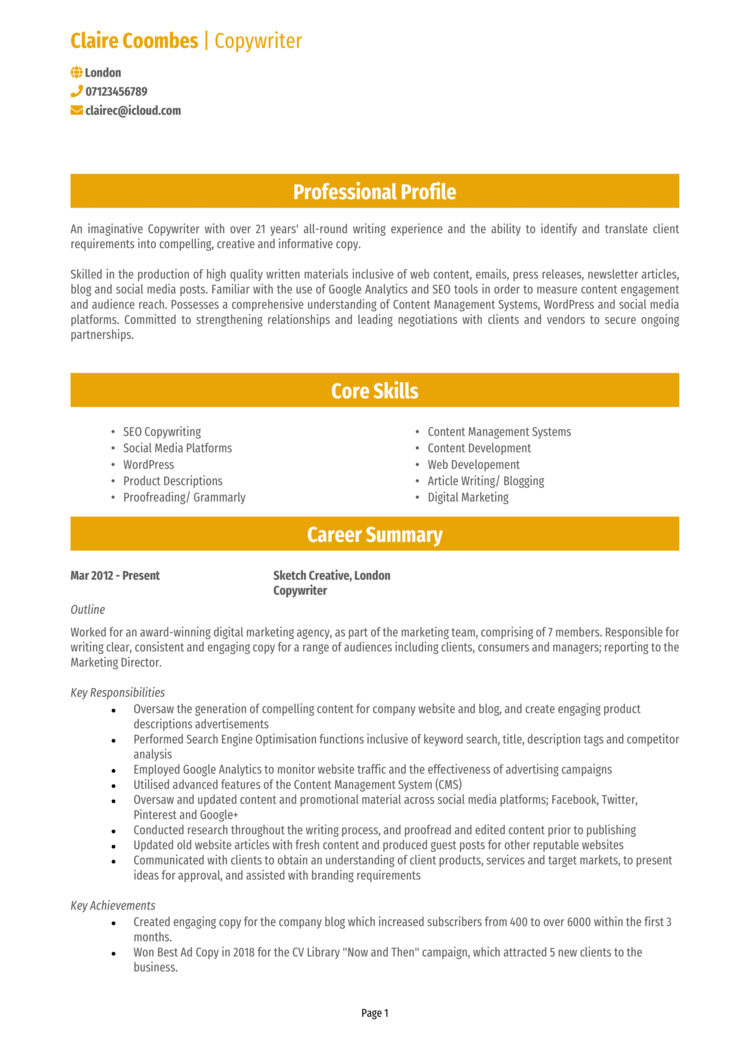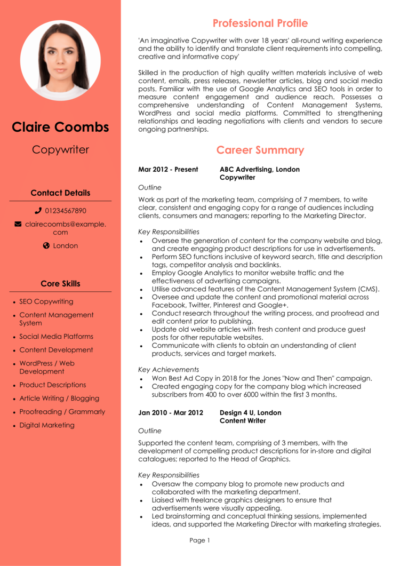Your copywriting skills are in high demand, and it can be an incredibly rewarding role.
The first piece of your writing you’re showing off to recruiters is your CV – so you’ll need to make sure it’s just as sharp and tailored as the work you’re hoping to do for them.
This guide, along with 3 Copywriter CV examples, will help you produce a CV that proves your creativity and expertise.
Copywriter CV

Freelance Copywriter CV

Creative Copywriter CV

How to write your Copywriter CV
Learn how to create your own interview-winning Copywriter CV with this simple step-by-step guide.
This guide will take you step-by-step through writing a Copywriter CV that highlights your writing expertise and overall ability to deliver compelling content. By the end, you’ll have a CV that positions you as the perfect candidate for your dream copywriting role.
Structuring your Copywriter CV


You know better than most that a good copy is more than just blocks of text stitched together. Recruiters want to quickly see your writing skills and your ability to work across different formats and platforms – don’t make them struggle to find it.
Here’s how to structure your Copywriter CV:
- Name and contact details – Keep these at the top for quick access. Adding a photo is optional.
- CV profile – Hook the reader with a concise summary of your copywriting expertise, industry experience, and standout achievements.
- Core skills – List the key strengths, from SEO writing and headlines to scriptwriting and branding, which make you the right candidate.
- Work experience – Detail your roles in reverse chronological order, focusing on your responsibilities and measurable results.
- Education – Note things like CIM qualifications, writing certifications, and any relevant training.
- Portfolio – Highlight a wide variety of work you’ve done in the past to prove your versatility.
- Additional info – In this optional space, discuss your hobbies and interests, personal projects, or awards that show your creativity and commitment.
Copywriter CV format


Even the most skilled writer can lose out if their CV’s format is unclear or poorly presented. Make sure your CV is as easy and pleasant to read as possible – the recruiter has sifted through enough applications today, so make this one easy on them.
Here’s some formatting tips for a Copywriter CV:
- Bullet points – Use these to break down responsibilities and achievements into clear, digestible points.
- Divide sections – Use clear headings to make navigating your CV easy for recruiters.
- Use a clean font – Prioritise readability with a professional font and consistent formatting.
- Keep it the right length – Aim for 2 pages: too long would start to bore the recruiter, and this is plenty of space to list the important details.
Creating your Copywriter CV profile


Like any piece of text, you should try to hook the reader and convince them to read further: your CV profile is your first opportunity to show why you’re the ideal copywriter for the role.
This section should highlight your ability to deliver creative and impactful content while tailoring your approach to meet client goals.
Copywriter CV profile examples
Profile 1
Creative Copywriter with five years of experience in crafting engaging content for digital marketing campaigns. Skilled in writing SEO-optimised web copy, social media posts, and email marketing campaigns that drive traffic and conversions. Proficient in tools like Google Analytics and SEMrush to track performance and refine strategies.
Profile 2
Organised Copywriter with three years of experience in the e-commerce sector, specialising in product descriptions, blog writing, and content strategy. Adept at creating compelling copy that enhances brand voice and improves customer engagement. Experienced in using WordPress and Canva for content creation and publishing.
Profile 3
Dedicated Copywriter with over eight years of experience in B2B marketing, focusing on whitepapers, case studies, and thought leadership articles. Skilled in transforming complex ideas into clear, persuasive copy that builds brand authority. Proficient in using HubSpot and Grammarly to ensure high-quality content delivery.
What to include in your Copywriter CV profile
Tailor your profile to role, mentioning the key things that make you the ideal candidate.
Make sure to cover:
- Where you’ve worked – Mention agencies, in-house teams, or freelance clients you’ve written for.
- Your top qualifications – Highlight degrees in English, marketing, or journalism, along with any certifications in SEO or content writing.
- Writing skills – Include expertise in short-form, long-form, or technical writing.
- Industries you’ve written for – Reference experience in sectors like tech, retail, or healthcare.
- Platforms you’re familiar with – Discuss whether you’ve worked on blogs, social media campaigns, or websites, for example.
- Key achievements – Showcase standout projects or campaigns that demonstrate your impact.
Core skills section


The core skills section is your chance to show off the specific abilities that make you a standout copywriter.
Focus on practical, results-driven skills tailored to the job you’re applying for. The job description already tells you what the recruiter wants, so make full use of that.
What are the most important skills for a Copywriter CV?
- SEO Writing – Crafting content that ranks highly in search results and drives organic traffic.
- Ad Copy Creation – Writing compelling, high-conversion ads for digital and print platforms.
- Brand Storytelling – Developing narratives that align with brand identity and resonate with target audiences.
- Social Media Content – Creating engaging posts and captions that grow brand awareness and drive engagement.
- Editing and Proofreading – Polishing copy to ensure clarity, consistency, and error-free writing.
- Technical Writing – Breaking down complex topics into accessible, easy-to-understand content.
- Campaign Analysis – Using performance data to refine and improve future copy.
- Email Marketing – Writing effective email campaigns that increase open and click-through rates.
- Content Management Systems (CMS) – Publishing and managing content using platforms like WordPress or HubSpot.
- B2B and B2C Expertise – Tailoring content strategies for both business and consumer audiences.
How to showcase your work experience on your CV


Your work experience section is where you demonstrate your ability to deliver results as a copywriter. It should form the bulk of your CV and show off roles that demonstrate your range, and the impact of your writing.
List your roles in reverse chronological order, starting with your most recent position. If you’re newer to the field, include internships, freelancing, or personal projects that showcase your skills.
The best way to structure job entries on your CV

- Outline – Briefly describe the company, your role, and the type of writing you focused on.
- Responsibilities – Highlight tasks like writing ad campaigns, managing blogs, or creating email sequences. Use action verbs like “wrote,” “developed,” or “managed.”
- Achievements – Include measurable outcomes, such as increased traffic, improved engagement rates, or successful campaign launches. Whenever possible, use data to quantify your results.
Example jobs for Copywriter
Copywriter | Echo Marketing
Outline
Created engaging and persuasive content for a digital marketing agency, focusing on driving traffic, improving engagement, and increasing conversions for a variety of clients. Collaborated with creative teams to execute brand-specific campaigns.
Responsibilities
- Developed SEO-optimised website content, including landing pages and blog posts.
- Crafted compelling ad copy for Google Ads and social media campaigns.
- Collaborated with designers to align visuals with written content for cohesive messaging.
- Conducted keyword research using tools like SEMrush to improve search rankings.
- Monitored content performance metrics and adjusted strategies for better results.
Achievements
- Increased organic website traffic for a key client by 40% within six months.
- Achieved a 20% increase in click-through rates by refining ad copy and A/B testing.
- Received Client Success Award for consistently delivering high-quality content.
Copywriter | Wordly Products
Outline
Worked as a Copywriter for an e-commerce brand, creating product descriptions and promotional content to enhance the customer shopping experience and increase sales. Focused on maintaining a consistent brand voice across all channels.
Responsibilities
- Wrote detailed, engaging, and SEO-friendly product descriptions to drive conversions.
- Developed copy for email marketing campaigns, promotional banners, and social media posts.
- Collaborated with the marketing team to plan seasonal campaigns and product launches.
- Reviewed and edited user-generated content for alignment with brand guidelines.
- Monitored the performance of content campaigns using Google Analytics.
Achievements
- Boosted product sales by 15% through improved product descriptions and call-to-actions.
- Increased email open rates by 25% with compelling subject lines and engaging content.
- Contributed to a 10% increase in customer retention by refining brand messaging.
Content Writer | Inkspire Agency
Outline
Produced high-quality content for a B2B marketing agency, focusing on whitepapers, case studies, and thought leadership articles. Helped clients establish authority and build trust with their target audience.
Responsibilities
- Researched industry trends to craft insightful whitepapers and reports for clients.
- Created engaging case studies that showcased client success stories and ROI.
- Wrote blog posts and articles to position clients as industry leaders.
- Collaborated with graphic designers to pair written content with impactful visuals.
- Tracked content engagement metrics and provided insights for future improvements.
Achievements
- Generated over 1,000 downloads for a client whitepaper within three months of release.
- Improved lead conversion rates by 20% through strategically crafted case studies.
- Secured repeat business from 90% of clients due to high-quality content delivery.
Education section


While recruiters certainly value experience more, the education section is a valuable way to reinforce your suitability for the role. Include anything from relevant degrees to certifications that prove your qualification.
For example, a degree in English Literature could demonstrate your command of language, while a marketing course might show your knack for audience engagement.
Include your qualifications in reverse chronological order, starting with the most recent.
Best qualifications for Copywriters
- Bachelor’s Degree in English, Journalism, or Marketing – Provides foundational skills in writing, communication, and audience engagement.
- SEO Content Writing Certification – Demonstrates proficiency in creating content optimised for search engines.
- HubSpot Content Marketing Certification – Validates skills in creating, managing, and promoting effective content campaigns.
- Google Ads Certification – Highlights expertise in crafting ad copy for Google’s ad platform.
Portfolio
For a Copywriter, your portfolio is just as important as your CV – it’s where recruiters can see your skills in action. Think of it as the proof behind the promises you’ve made in your CV.
Include a link to your online portfolio at the end of your CV, beneath the Additional Info section. Highlight a variety of writing styles and formats to showcase your range and adaptability.
Here’s a few tips for an effective copywriter portfolio:
- Tailored for the role – Highlight samples that reflect the industry and type of writing the job focuses on. For example, include technical pieces for B2B roles or engaging ads for consumer-focused positions.
- Balanced and diverse – Show a mix of formats, such as blog posts, ad copy, email campaigns, social media content, and whitepapers, to demonstrate versatility.
- Results-oriented – Whenever possible, include performance metrics (e.g., increased traffic, click-through rates, or conversion improvements) to show the impact of your work.
- Organised layout – Arrange your samples logically, grouping similar types of writing together, and provide brief explanations for each.
- Professional presentation – Use a clean, easy-to-navigate design for your portfolio, whether it’s a personal website or hosted on a platform like Contently or Behance.





